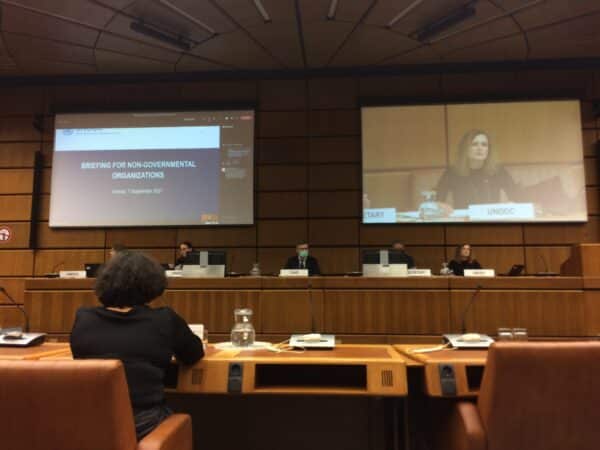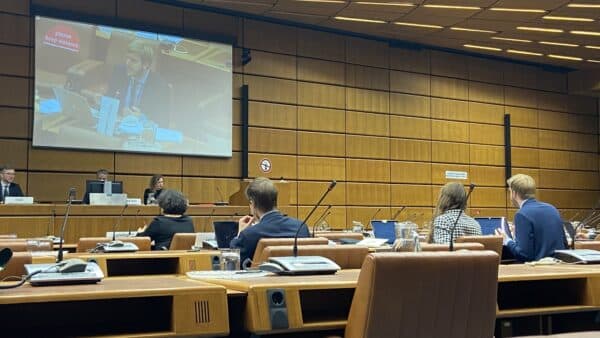17 September 2021 –
The yearly NGO briefing took place last week on the margins of the 12th resumed session of the UNCAC Implementation Review Group (IRG). The briefing was held in a hybrid manner, allowing for in-person and remote participation. 60 Participants from 35 CSOs, as well as representatives of (only) 9 States Parties, attended the briefing.
During the briefing, UNODC presented its thematic reports on the implementation of Chapter II and Chapter V of the UNCAC, including identified challenges and good practices, as well as an overview of the status of the country reviews – to this end, the pace of the second cycle review continues to be way behind schedule, with only 31 out of 188 country reports concluded (including Somalia that recently signed the Convention). The UNCAC secretariat raised serious concerns about the current pace, as it will not allow for the completion of the second cycle by the already extended deadline of June 2024. This will result in further delays in moving forward towards the next phase of the review, which should focus on follow-up actions to the first two cycles of the UNCAC Implementation Review Mechanism (IRM).
The “Marrakesh compromise”: a 10-year temporary solution, and counting
Civil society is not permitted to participate in the official IRG plenary sessions, as well as in the meetings of the other CoSP subsidiary bodies, due to persistent opposition from a small but influential group of countries. This is problematic and inconsistent with international human rights standards, Goal 16 of the Sustainable Development Goals, and with transparency and participation standards within the Convention itself. The NGO briefing is, therefore, a mere “compromise” achieved at the 4th CoSP in 2011 to keep civil society updated about the status of the country reviews and UNCAC implementation, giving room for CSOs to provide updates on their work to support the implementation of the UNCAC, as well as to allow space for discussion between the different stakeholders.
In her statement, Gillian Dell, representing Transparency International, recalled that the “Marrakesh compromise” is now 10 years old and was intended as a temporary trust-building exercise, not a permanent feature. Ms. Dell welcomed the G7 UNGASS statement committing to promoting the inclusion of civil society as observers in UNCAC subsidiary bodies and urged other UNCAC States parties to join this initiative.
Country reviews in times of COVID-19
Naturally, delays in the review process have been exacerbated by Covid-19. Many countries have postponed the country visit in the context of their review, while only very few States Parties decided to replace the in-person country visit with a virtual or a hybrid one. Mathias Huter, Managing Director of the UNCAC Coalition called on States Parties to increase the transparency of the review process and for the meaningful inclusion of civil society also in virtual country visits. He stressed that it is difficult to identify the stage of country reviews since many States Parties choose not to publish the contact details of the review focal point and do not publish updated information on the schedule of country visits.
Moreover, only 17 full country reports and 5 self-assessment checklists were voluntarily published under the second cycle. In response, the UNCAC secretariat mentioned that it made efforts to regularly update the information published on the UNODC country profile pages pertaining to the country reviews, to the extent that the country under review permits them to share such information. The UNCAC secretariat is open to any proposals that will help to improve information-sharing on country reviews, in line with the Terms of Reference of the review mechanism.
Follow-up on commitments & recommendations
Another question raised by Ms. Dell related to the recently adopted UNGASS political declaration and the extent to which the commitments made therein could serve as a basis for improving UNCAC implementation and addressing other gaps. The UNCAC secretariat highlighted that the IRM itself will not look into the UNGASS commitments. However, the secretariat stressed that the political declaration has touched upon some elements which were not originally in the Convention, including going further than the UNCAC in some areas, and that it hopes that the implementation of the political declaration will be picked up by the CoSP, leading governments to draw on it for work in areas where gaps have been identified.
Another key issue raised by Mr. Huter during the briefing concerned country actions to follow up on review recommendations since so far, in the context of the second cycle review, only one country has voluntarily published information on its follow-up actions on its country profile page. He suggested drafting a follow-up template which might facilitate the sharing of such information by the States Parties; an idea which was received positively by the UNCAC secretariat.
Mr. Huter also underlined the legalistic nature of the reviews and the fact that they do not sufficiently look into the actual enforcement and impact of anti-corruption provisions, as also mentioned in the FACTI panel report. Replying to these concerns, the secretariat mentioned that States Parties do share, to some extent, follow-up information on their actions. However, much of this information is shared during IRG sessions which are not open to civil society. In order ” to dig deeper” and to measure impact and enforcement in the context of the review mechanism, the next follow-up phase of the IRM should be discussed and shaped accordingly, the secretariat stressed.
With regards to the provision of technical assistance, UNODC shared that it supports States Parties in Covid-19 recovery, strengthening public procurement transparency and whistleblower protection. Corruption risk management processes with national health authorities have been conducted as a form of crisis response. UNODC further shared that regulation of its partnerships, including with civil society, was recently simplified, allowing for more engagement with CSOs that could become involved in supporting efforts to provide effective technical assistance to countries.
Is the NGO briefing a truly constructive dialogue?
CoSP Resolution 4/6 mentions that the objective of the NGO briefing is to “promote constructive dialogue with NGOs.” Although having the option to attend in-person or virtually, very few States Parties participated in the last few NGO briefings. Besides Transparency International and the UNCAC Coalition, CSOs such as the Global Initiative against Transnational Organized Crime (GI-TOC) and the Alliance of NGOs on Crime Prevention and Criminal Justice delivered statements and raised questions during the briefing.
Unfortunately, none of the States parties chose to address these questions or to deliver statements of their own. The Coalition raises concerns regarding this trend of minimal state party participation during the NGO briefing, coming back to the question: how should this “constructive dialogue” actually look, and where are the States Parties in this regard?
The UNCAC Coalition made the following written submissions to the resumed 12th session of the IRG as well as co-hosted these side events and wishes to reiterate its invitation to States Parties to make use of its network and expertise to advance forward-looking commitments at the upcoming 9th UNCAC CoSP.





